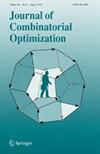Bivalent quadratic optimization with sum-of-square of quadratic penalties
IF 1.1
4区 数学
Q4 COMPUTER SCIENCE, INTERDISCIPLINARY APPLICATIONS
引用次数: 0
Abstract
The problem of maximizing the sum-of-square of quadratic functions with bivalent variables, denoted by (P), arises from bivalent quadratic optimization with K quadratic disjunctive penalties. Though NP-hard in general, (P) is polynomially solvable when the input matrices can concatenate to a fixed-rank matrix. We present a nonconvex quadratic semidefinite programming (SDP) relaxation, which provides a 0.4-approximate solution for (P). We show that the quadratic SDP relaxation can be approximately and globally solved to a precision via solving at most linear SDP subproblems.
具有二次惩罚平方和的二价二次优化
带二价变量(P)的二次函数的平方和的最大化问题,是由带有K次二次析取惩罚的二价二次优化问题引起的。虽然一般来说np困难,但当输入矩阵可以连接到固定秩矩阵时,(P)是多项式可解的。我们提出了一个非凸二次半定规划(SDP)松弛,它提供了(P)的0.4近似解。我们证明,通过求解至多O((Kn3/ λ)K/2)O((Kn^3/\epsilon)^{K/2})线性SDP子问题,二次SDP松弛可以近似且全局求解到精度为λ \epsilon。
本文章由计算机程序翻译,如有差异,请以英文原文为准。
求助全文
约1分钟内获得全文
求助全文
来源期刊

Journal of Combinatorial Optimization
数学-计算机:跨学科应用
CiteScore
2.00
自引率
10.00%
发文量
83
审稿时长
6 months
期刊介绍:
The objective of Journal of Combinatorial Optimization is to advance and promote the theory and applications of combinatorial optimization, which is an area of research at the intersection of applied mathematics, computer science, and operations research and which overlaps with many other areas such as computation complexity, computational biology, VLSI design, communication networks, and management science. It includes complexity analysis and algorithm design for combinatorial optimization problems, numerical experiments and problem discovery with applications in science and engineering.
The Journal of Combinatorial Optimization publishes refereed papers dealing with all theoretical, computational and applied aspects of combinatorial optimization. It also publishes reviews of appropriate books and special issues of journals.
 求助内容:
求助内容: 应助结果提醒方式:
应助结果提醒方式:


